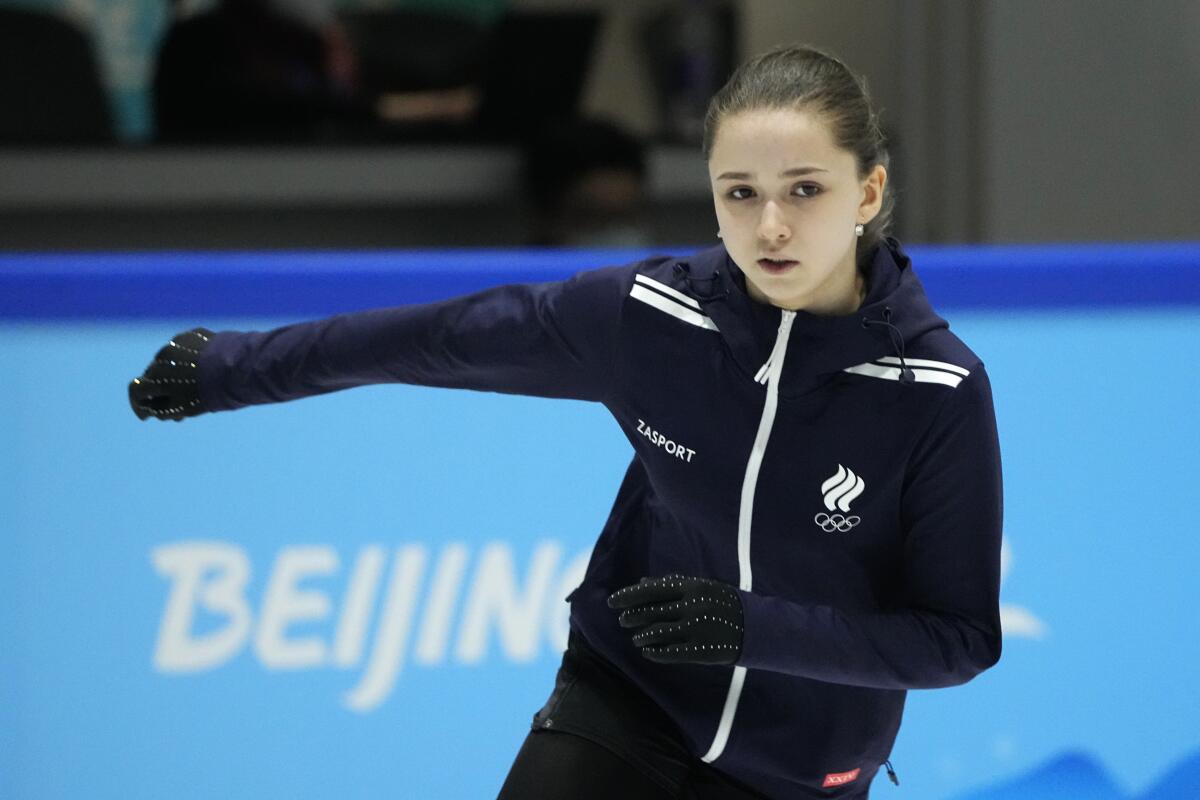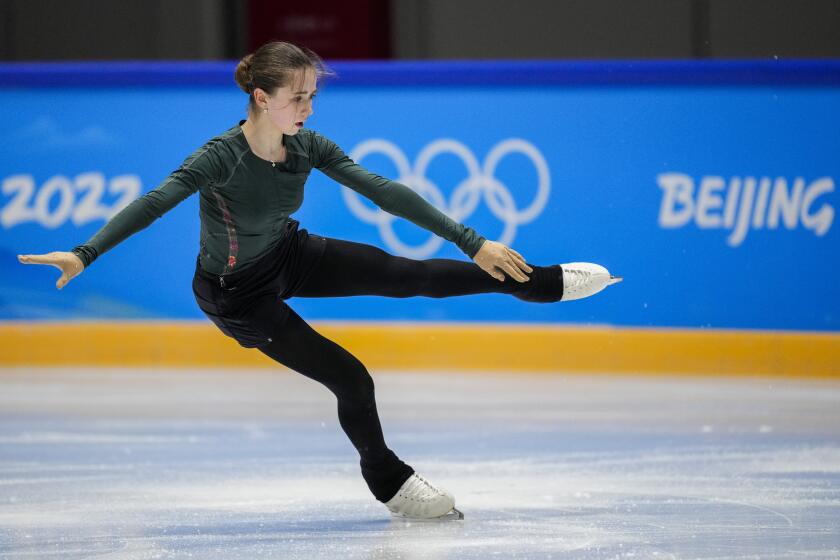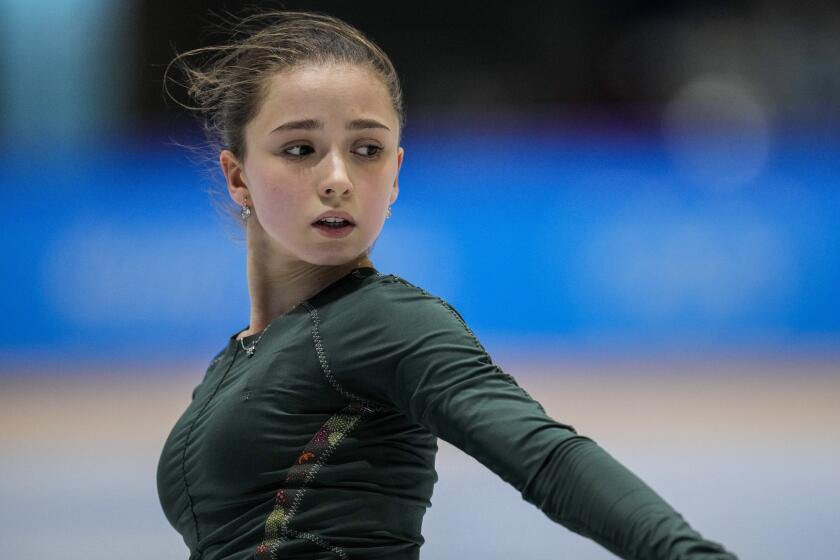What you need to know about the controversy involving Russian skater Kamila Valieva

- Share via
ZHANGJIAKOU, China — A delayed medal ceremony was only the beginning.
When the team figure skating medal ceremony was canceled without explanation last Tuesday, it opened a door into a controversial legal case involving Russian figure skating star Kamila Valieva.
The 15-year-old made Olympic history as the first woman to land a quad jump and helped athletes from the Russian Olympic Committee win the team figure skating gold medal, but the achievement has been marred by a failed pre-Winter Olympics drug test.
Despite evidence that Valieva tested positive for a banned substance Dec. 25, the teenage sensation still will be allowed to skate in the women’s competition, which begins Tuesday with the short program at Capital Indoor Stadium.
Here’s what to know about the situation:
Kamila Valieva will be allowed to continue to compete at the Beijing Olympics despite failing a drug test before the Games started.
How did we get here?
Valieva tested positive for the heart drug trimetazidine Dec. 25 at the Russian national championships, but she was allowed to compete in the Olympics and even help the ROC to a team gold medal Feb. 7. The results didn’t become public until a lab in Sweden flagged them last Tuesday and the International Olympic Committee canceled the medal ceremony, citing a “legal issue.” The United States won silver in the team event, and Japan took bronze.
Russian newspaper RBC initially reported that Valieva tested positive for trimetazidine, which is used to treat angina and is prohibited by the World Anti-Doping Agency (WADA). Valieva’s attorneys say the failed test was because of contamination from medication her grandfather was taking.
Russian officials imposed an immediate Olympic ban on Valieva when the results became public but then lifted it the next day. The International Olympic Committee (IOC), International Skating Union (ISU) and WADA appealed to have the suspension reinstated, but the Court of Arbitration for Sport dismissed the appeals Monday to allow Valieva to compete.
Out of options, the IOC announced that no medal ceremonies would be held for the women’s figure skating competition if Valieva won a medal. That is likely, as the 15-year-old is a heavy favorite to win gold. Also, there will be no medals ceremony for the team competition.
What does Valieva’s age have to do with it?
Valieva’s age is a key sticking point in the case. At 15, she is a “protected person” under the World Anti-Doping Code. The court of arbitration cited her age as a reason why she would be allowed to compete.
Athletes under 16 such as Valieva are afforded more rights under anti-doping rules and aren’t always held responsible for a doping violation. Future investigations might focus on people on her staff such as coaches, doctors or trainers.
How have people in figure skating responded?
In short, not well. Former Olympian Adam Rippon, who is in Beijing coaching U.S. national champion Mariah Bell, has been outspoken on Twitter. He called the women’s competition “a complete joke” because Valieva is allowed to compete, expressed concern for the teenager’s mental health during the “incredibly sad situation,” and said the decision will cause irreparable harm to the entire Olympic Games.
Decision by Court of Arbitration for Sport indicates it’s OK to be a drug cheat if you are younger than 16. IOC won’t hold medal ceremonies in response to ruling.
“The infuriating fact is that everything that makes Kami an amazing skater (spins, flow, flexibility) none of it can come from a drug,” Rippon continued on Twitter. “But, her team didn’t want to play by the rules.”
Immediately after the Court of Arbitration for Sport allowed Valieva to skate, USOPC chief executive Sarah Hirshland released a statement expressing frustration at the decision.
“We are disappointed by the message this decision sends,” the statement read in part. “It is the collective responsibility of the entire Olympic community to protect the integrity of sport and to hold our athletes, coaches and all involved to the highest of standards. Athletes have the right to know they are competing on a level playing field. Unfortunately, today that right is being denied. This appears to be another chapter in the systemic and pervasive disregard for clean sport in Russia.”
Of course, if Valieva were disqualified, then the U.S. would move up to the gold medal in the team competition.
What about Russia’s history with doping?
There’s a reason why “Russia” isn’t officially at the Olympics. WADA banded Russia, as a nation, from international sports competition in 2019 because of its history of state-run doping schemes. That’s why Russian athletes in Beijing compete under the “Russian Olympic Committee” name and won’t hear their national anthems or see their national flag. The four-year ban came after Russian officials manipulated data to protect athletes who were involved in the state-sponsored plots.
It wasn’t the first time Russian athletes were at the center of a doping scandal. The IOC barred Russia from the 2018 Winter Olympics for doping, but, after an appeal from athletes who were not linked to the scheme, those who weren’t involved were allowed to compete as a team called “Olympic athletes from Russia.”
More to Read
Go beyond the scoreboard
Get the latest on L.A.'s teams in the daily Sports Report newsletter.
You may occasionally receive promotional content from the Los Angeles Times.








